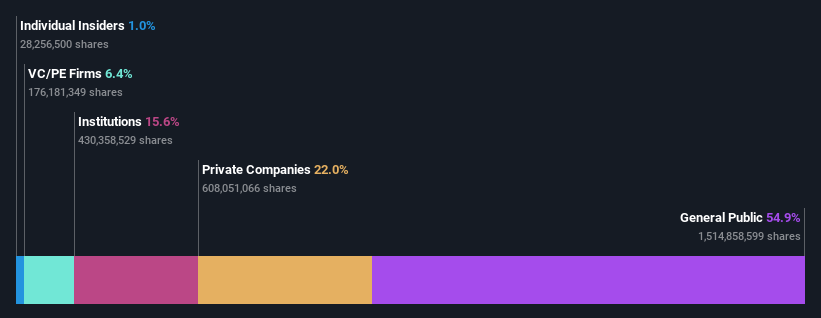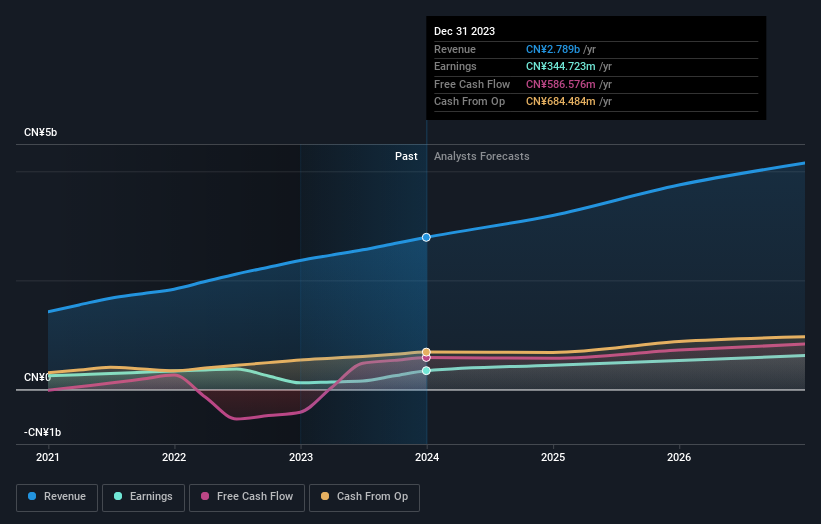Stock Analysis
- Hong Kong
- /
- Healthcare Services
- /
- SEHK:1951
Individual investors are Jinxin Fertility Group Limited's (HKG:1951) biggest owners and were hit after market cap dropped HK$800m

Key Insights
- Jinxin Fertility Group's significant individual investors ownership suggests that the key decisions are influenced by shareholders from the larger public
- 43% of the business is held by the top 25 shareholders
- Recent purchases by insiders
Every investor in Jinxin Fertility Group Limited (HKG:1951) should be aware of the most powerful shareholder groups. The group holding the most number of shares in the company, around 55% to be precise, is individual investors. Put another way, the group faces the maximum upside potential (or downside risk).
As market cap fell to HK$6.5b last week, individual investors would have faced the highest losses than any other shareholder groups of the company.
Let's delve deeper into each type of owner of Jinxin Fertility Group, beginning with the chart below.
Check out our latest analysis for Jinxin Fertility Group

What Does The Institutional Ownership Tell Us About Jinxin Fertility Group?
Institutions typically measure themselves against a benchmark when reporting to their own investors, so they often become more enthusiastic about a stock once it's included in a major index. We would expect most companies to have some institutions on the register, especially if they are growing.
As you can see, institutional investors have a fair amount of stake in Jinxin Fertility Group. This can indicate that the company has a certain degree of credibility in the investment community. However, it is best to be wary of relying on the supposed validation that comes with institutional investors. They too, get it wrong sometimes. It is not uncommon to see a big share price drop if two large institutional investors try to sell out of a stock at the same time. So it is worth checking the past earnings trajectory of Jinxin Fertility Group, (below). Of course, keep in mind that there are other factors to consider, too.

Jinxin Fertility Group is not owned by hedge funds. Our data shows that Jinxin Fertility Investment Group Limited is the largest shareholder with 12% of shares outstanding. With 10% and 6.4% of the shares outstanding respectively, HRC Investment Holding, LLC and Hillhouse Investment Management, Ltd. are the second and third largest shareholders.
On studying our ownership data, we found that 25 of the top shareholders collectively own less than 50% of the share register, implying that no single individual has a majority interest.
Researching institutional ownership is a good way to gauge and filter a stock's expected performance. The same can be achieved by studying analyst sentiments. Quite a few analysts cover the stock, so you could look into forecast growth quite easily.
Insider Ownership Of Jinxin Fertility Group
While the precise definition of an insider can be subjective, almost everyone considers board members to be insiders. Company management run the business, but the CEO will answer to the board, even if he or she is a member of it.
Insider ownership is positive when it signals leadership are thinking like the true owners of the company. However, high insider ownership can also give immense power to a small group within the company. This can be negative in some circumstances.
Our most recent data indicates that insiders own some shares in Jinxin Fertility Group Limited. As individuals, the insiders collectively own HK$67m worth of the HK$6.5b company. Some would say this shows alignment of interests between shareholders and the board. But it might be worth checking if those insiders have been selling.
General Public Ownership
The general public, who are usually individual investors, hold a substantial 55% stake in Jinxin Fertility Group, suggesting it is a fairly popular stock. This size of ownership gives investors from the general public some collective power. They can and probably do influence decisions on executive compensation, dividend policies and proposed business acquisitions.
Private Equity Ownership
Private equity firms hold a 6.4% stake in Jinxin Fertility Group. This suggests they can be influential in key policy decisions. Some might like this, because private equity are sometimes activists who hold management accountable. But other times, private equity is selling out, having taking the company public.
Private Company Ownership
Our data indicates that Private Companies hold 22%, of the company's shares. It might be worth looking deeper into this. If related parties, such as insiders, have an interest in one of these private companies, that should be disclosed in the annual report. Private companies may also have a strategic interest in the company.
Next Steps:
I find it very interesting to look at who exactly owns a company. But to truly gain insight, we need to consider other information, too.
I like to dive deeper into how a company has performed in the past. You can find historic revenue and earnings in this detailed graph.
But ultimately it is the future, not the past, that will determine how well the owners of this business will do. Therefore we think it advisable to take a look at this free report showing whether analysts are predicting a brighter future.
NB: Figures in this article are calculated using data from the last twelve months, which refer to the 12-month period ending on the last date of the month the financial statement is dated. This may not be consistent with full year annual report figures.
Valuation is complex, but we're helping make it simple.
Find out whether Jinxin Fertility Group is potentially over or undervalued by checking out our comprehensive analysis, which includes fair value estimates, risks and warnings, dividends, insider transactions and financial health.
View the Free AnalysisHave feedback on this article? Concerned about the content? Get in touch with us directly. Alternatively, email editorial-team (at) simplywallst.com.
This article by Simply Wall St is general in nature. We provide commentary based on historical data and analyst forecasts only using an unbiased methodology and our articles are not intended to be financial advice. It does not constitute a recommendation to buy or sell any stock, and does not take account of your objectives, or your financial situation. We aim to bring you long-term focused analysis driven by fundamental data. Note that our analysis may not factor in the latest price-sensitive company announcements or qualitative material. Simply Wall St has no position in any stocks mentioned.

Simply Wall St
About SEHK:1951
Jinxin Fertility Group
Jinxin Fertility Group Limited, an investment holding company, provides assisted reproductive services (ARS) in China and the United States.
Proven track record and fair value.
